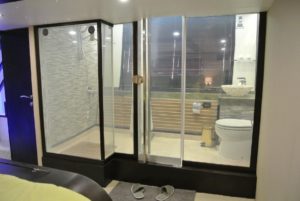Smart glass or switchable glass (also smart windows or switchable windows in those applications) is glass or glazing whose light transmission properties are altered when voltage, light or heat is applied. Generally, the glass changes from translucent to transparent, changing from blocking some (or all) wavelengths of light to letting light pass through.
Smart glass technologies include electrochromic, photochromic, thermochromic, suspended particle, micro-blind and polymer dispersed liquid crystal devices.
When installed in the envelope of buildings, smart glass creates climate adaptive building shells, with the ability to save costs for heating, air-conditioning and lighting and avoid the cost of installing and maintaining motorized light screens or blinds or curtains. Blackout smart glass blocks 99.4% of ultraviolet light, reducing fabric fading; for SMART GLASS-type smart glass, this is achieved in conjunction with low emissivity coatings.
Automotive & Aircraft & Marine
SMART GLASS allows users to more comfortably maintain their views of the outside and to enjoy glare-free viewing of displays and video screens. SMART GLASS lets the user instantly and precisely control the amount of light, glare and heat passing through windows, skylights, portholes, partitions and doors.
Smart Glass are available as laminated panels or insulated glass units for new construction, replacement and retrofit projects. These products offer a distinctive blend of energy efficiency, user comfort and security. Architectural products made with SMART GLASS technology:
- Eliminate blinds and shades
- Preserve daytime and nighttime views
- Allow people to enjoy shading on-demand
- Minimize glare
- Reduce heating and cooling requirements
- Maximize daylighting
- Protect interior furnishings and artwork from fading


